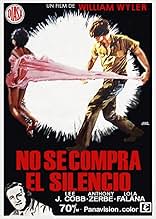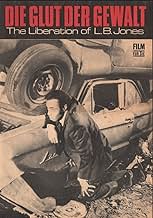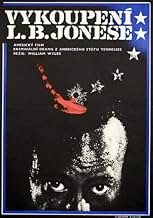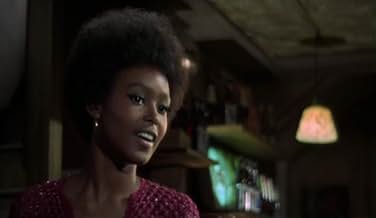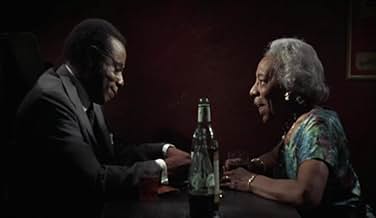NOTE IMDb
6,8/10
1,3 k
MA NOTE
Un avocat sudiste révèle la vérité sur un croque-mort assassiné.Un avocat sudiste révèle la vérité sur un croque-mort assassiné.Un avocat sudiste révèle la vérité sur un croque-mort assassiné.
- Réalisation
- Scénario
- Casting principal
- Récompenses
- 1 nomination au total
Joseph Attles
- Henry
- (as Joe Attles)
Avis à la une
The Liberation of L. B. Jones (1970) is currently available on Tubi. The storyline involves a black couple going through a divorce when the man discovers his wife is cheating on him with a local white police officer. When the woman hires a lawyer and threatens to fight the divorce, the police officer is informed the nature of their relationship may become public. Since white and black people sleeping together is heavily frowned upon the police officer could lose his job. He quickly goes on a rampage beating his lover and trying to hide the nature of their relationship by any means necessary. This movie is directed by William Wyler (Ben-Hur) and stars Lee J. Cobb (12 Angry Men), Lola Falana (The Klansman), Lee Majors (The Six Million Dollar Man), Roscoe Lee Browne (Logan's Run) and Yaphet Kotto (Alien). The storyline for this is very well told and portrayed. The ex-husband's patience was absolutely unbelievable, but so was his wife's ruthlesness. This movie in some ways gave me divorce PTSD. I loved the character interactions across the board and the set-up by the ruthless and dirty police officers was good, which makes the ending even more enjoyable. Overall this is a smart movie with a well told storyline I would strongly recommend seeing. I'd score this a solid 7.5/10.
William Wyler had such a diverse and non-stereotypical career. He painted on a grand canvas with "Ben-Hur," "Funny Girl," and "The Big Country," romped about with fluff on "Roman Holiday" and "How To Steal A Million," and reined in on tight dramas like "Jezebel," "Detective Story," and "The Collector", all to name but a few. "The Liberation of L.B. Jones" was his last film, and its message is still powerful and taut. Here, Wyler reins in very tightly on a drama, placing his camera stock still in three-walled sets and allows the intensity to grow from the individuals coming undone within its frame.
Hollywood was just turning the corner in its presentation of dramatic material around 1970, with the revolutionary "The Graduate," "Bonnie & Clyde", and "Midnight Cowboy" already released, so Wyler's effort appears rooted to an earlier period in its presentation. Elmer Bernstein's music is bombastic and overly showy. The confining studios sets scream of the backlot environment "daring" pictures were then moving away from. And Wyler's static camera technique is a far cry from the fluid shots used by up 'n coming directors Penn, Nichols, Friedkin, and Wexler. But the overall tone and downbeat ending of "Jones" foreshadowed the de rigueur hard-edged storytelling that would make '70s pictures so vibrant.
Taking place in some jerkwater burg in Tennessee, the title character of L.B. Jones (played with dignified austerity by Roscoe Lee Browne) is a wealthy undertaker whose wife (the smoldering hussy embodied by Lola Falana) is practically rubbing his nose in her affair with a local cop. Jones wants to divorce her. The proceedings, if a courtroom action is necessary, would reveal her liaisons with the policeman, played by Anthony Zerbe, and Zerbe truly does not want his own wife to know of his infidelity. Thus, sets in motion the harrassment and tragedy of L.B.'s situation as only a town full of rednecks can perpetrate towards the threat of an intelligent, self-made African-American man.
Lee J. Cobb as the town's D.A. who always finds a way to help out the white folks, at the expense of blacks, walks a fine line of bigotry and self-discovery. It may be L.B.'s "liberation", but it's Cobb's character that will ultimately be put to a test. What's unique about this film is that he fails, miserably. Most movies made in the '80s and '90s about the racial plight of African-Americans, whether it be "Cry Freedom" or "Amistad" always have that knight in shining "white" armor that studios feel are needed to "help" the black man break the bonds of tyranny. The black character is never allowed to just gain freedom, discovery or triumph on the merits of his own strengths. This film has the guts to show L.B. take his "liberation" into his own hands, albeit with tragic results, and damns the white majority who are a long way from compassion and understanding.
The standout performance in the flick comes from Anthony Zerbe. If all you've seen are his scenery chewing in "Omega Man," his digit-dropping in "Papillon" or his head exploding in "License To Kill," check out his fully-fleshed out character of Willie Joe in this film. He embodies centuries of redneckdom in one person, portraying the self-inflated, unrepentent coward sheltered in police corruption so effectively that he masterfully overshadows the performances of everyone else onscreen. Unfortunately, Yaphet Kotto as a vengeful out of town visitor is given very little to do. And Barbara Hershey and Lee Majors barely have enough motivation to fill in their sketchy roles as Cobb's daughter and her altruistic lawyer husband.
If you can stand a little datedness to the narrative (and Elmer Bernstein's horrible score), take a look at this unflinching glimpse at an era of bigotry we thought was eradicated...but it's obviously not. My rating **1/2 out of ****.
Hollywood was just turning the corner in its presentation of dramatic material around 1970, with the revolutionary "The Graduate," "Bonnie & Clyde", and "Midnight Cowboy" already released, so Wyler's effort appears rooted to an earlier period in its presentation. Elmer Bernstein's music is bombastic and overly showy. The confining studios sets scream of the backlot environment "daring" pictures were then moving away from. And Wyler's static camera technique is a far cry from the fluid shots used by up 'n coming directors Penn, Nichols, Friedkin, and Wexler. But the overall tone and downbeat ending of "Jones" foreshadowed the de rigueur hard-edged storytelling that would make '70s pictures so vibrant.
Taking place in some jerkwater burg in Tennessee, the title character of L.B. Jones (played with dignified austerity by Roscoe Lee Browne) is a wealthy undertaker whose wife (the smoldering hussy embodied by Lola Falana) is practically rubbing his nose in her affair with a local cop. Jones wants to divorce her. The proceedings, if a courtroom action is necessary, would reveal her liaisons with the policeman, played by Anthony Zerbe, and Zerbe truly does not want his own wife to know of his infidelity. Thus, sets in motion the harrassment and tragedy of L.B.'s situation as only a town full of rednecks can perpetrate towards the threat of an intelligent, self-made African-American man.
Lee J. Cobb as the town's D.A. who always finds a way to help out the white folks, at the expense of blacks, walks a fine line of bigotry and self-discovery. It may be L.B.'s "liberation", but it's Cobb's character that will ultimately be put to a test. What's unique about this film is that he fails, miserably. Most movies made in the '80s and '90s about the racial plight of African-Americans, whether it be "Cry Freedom" or "Amistad" always have that knight in shining "white" armor that studios feel are needed to "help" the black man break the bonds of tyranny. The black character is never allowed to just gain freedom, discovery or triumph on the merits of his own strengths. This film has the guts to show L.B. take his "liberation" into his own hands, albeit with tragic results, and damns the white majority who are a long way from compassion and understanding.
The standout performance in the flick comes from Anthony Zerbe. If all you've seen are his scenery chewing in "Omega Man," his digit-dropping in "Papillon" or his head exploding in "License To Kill," check out his fully-fleshed out character of Willie Joe in this film. He embodies centuries of redneckdom in one person, portraying the self-inflated, unrepentent coward sheltered in police corruption so effectively that he masterfully overshadows the performances of everyone else onscreen. Unfortunately, Yaphet Kotto as a vengeful out of town visitor is given very little to do. And Barbara Hershey and Lee Majors barely have enough motivation to fill in their sketchy roles as Cobb's daughter and her altruistic lawyer husband.
If you can stand a little datedness to the narrative (and Elmer Bernstein's horrible score), take a look at this unflinching glimpse at an era of bigotry we thought was eradicated...but it's obviously not. My rating **1/2 out of ****.
This is a sad film about personal weaknesses. The storyline has several weak points too, but on the whole I should think the movie does a great director like William Wyler justice and is still watchable today. There is a certain similarity with the Oscar winning In the Heat of the Night. The screenplay is by the same author, Stirling Silliphant.
The Liberation of L. B. Jones really belongs to the African American cast, the whites' performances do pale in comparison. Roscoe Lee Browne plays the well-to-do undertaker who is cheated by his wife with a white policeman. He gives his character a quiet dignity that lasts throughout the story, up to the bitter and sad end. Yaphet Kotto's portrayal of an angry young man who comes to town with a score to settle is equally intense and convincing. Both Browne and Kotto have a few very good scenes in which they act by themselves. They both seize the chance to give their characters real depth. Lola Falana is convincing as the amoral undertaker's wife and there is a good supporting cast. I fondly remember a small, well acted scene at the beginning with an elderly lady who regularly visits the undertaker's show room to have a look at the coffin for which she pays instalments.
The white population is, it seems to me, much more stereotypical. The only really interesting figure here is the town's most important lawyer, played somewhat stiffly by Lee J. Cobb. He is a racist against his better judgment. His unlawful actions to protect white criminals seem like a reflex, not coming from the brain but rather from the spinal cord.
The Liberation of L. B. Jones really belongs to the African American cast, the whites' performances do pale in comparison. Roscoe Lee Browne plays the well-to-do undertaker who is cheated by his wife with a white policeman. He gives his character a quiet dignity that lasts throughout the story, up to the bitter and sad end. Yaphet Kotto's portrayal of an angry young man who comes to town with a score to settle is equally intense and convincing. Both Browne and Kotto have a few very good scenes in which they act by themselves. They both seize the chance to give their characters real depth. Lola Falana is convincing as the amoral undertaker's wife and there is a good supporting cast. I fondly remember a small, well acted scene at the beginning with an elderly lady who regularly visits the undertaker's show room to have a look at the coffin for which she pays instalments.
The white population is, it seems to me, much more stereotypical. The only really interesting figure here is the town's most important lawyer, played somewhat stiffly by Lee J. Cobb. He is a racist against his better judgment. His unlawful actions to protect white criminals seem like a reflex, not coming from the brain but rather from the spinal cord.
Obviously made in the wake of In the Heat of the Night's financial and awards success, William Wyler's final film, The Liberation of L. B. Jones, based on the novel The Liberation of Lord Byron Jones by Jesse Hill Ford (who wrote the first draft of the screenplay, later taken over by Stirling Silliphant), is another look at racist institutions in the South in the days of Jim Crow. I think, despite Norman Jewison's earlier film's successes, that Wyler left the filmmaking world on a relative high note, succeeding more fully artistically while bearing its own set of small flaws that keep it down.
The titular character, Lord Byron Jones (Roscoe Lee Browne) is the respected black undertaker in the small Tennessee town of Somerton. He is married to a young woman, Emma (Lola Falana) who has taken up an affair with one of the white police officers, Willie Joe (Anthony Zerbe), in secret enough for Willie Joe to keep the knowledge from his own wife and children (whom we never see, which I think is something of an odd choice, but I'll get to that) but not secret enough that she isn't afraid of flaunting it around the Jones house in her own room. Jones wants a divorce, and he goes to the office of Oman Hedgepath (Lee J. Cobb) to hire him in what he says will be an uncontested divorce. Only through Hedgepath's new law partner, his nephew Steve (Lee Majors), does Hedgepath decide to take the case, which quickly turns complicated when Emma decides to contest the divorce for her own reasons.
The film is an exploration of the unspoken ways that things get done in a system where the law cannot be followed in order to preserve certain customs and power centers. Willie Joe is a white man in a segregated town, and Cobb feels more for Willie Joe and the potential collapse of his life, both professional and personal, than for the cuckolded L. B. Jones of another race. So, he tells Willie Joe to convince Emma to drop the suit, implying that the only way to get out of this is to prevent the divorce from happening. Willie Joe is a not terribly bright young man who has a tendency to take advantage of his position of power to get whatever it is he wants, and he's just the kind of person who would take things too far.
My central issue with the film is Willie Joe himself. He's viciously evil in a way that leaves no room for interpretation. Part of that presentation is, I think, the complete lack of presence by his family, but it's heightened by one scene that stands out. A young black man has been taken in on a small charge, and his wife approaches him in his squad car, begging for help to get him out so he can go back to work the next day. He, along with his squad car partner, take her out into the country where Willie Joe rapes the girl. I mean, we've already seen Willie Joe slap around Emma violently when she won't do what he says, did the portrayal need to go this far? That, combined with the absence of his family makes Willie Joe really one-note in a way that smooths out any potential wrinkles. This feels like an effort on the part of Wyler and his screenwriters (the book was apparently based on some real life events in Ford's hometown, and they were not happy with him for the portrayals) probably took the character of Willie Joe in particular as an obvious signal to the audience that they were "on the right side of history" or something. It makes the drama less compelling by making the point more obvious.
Thankfully, though, the central dramatic fulcrum is not Willie Joe. It's this intricate balance between Jones himself, Hedgepath and his nephew, and a more minor character, Sonny (Yaphet Kotto). He actually begins the film by jumping off the train passing through Somerset with a pistol in a cigar box, filtering through the movie in the background and interacting with Jones in some small ways. He's a native of Somerset who fled fifteen years prior because a white cop had beaten him terribly, returned to exact vengeance. There's a mirror aspect between Sonny's decision to let his anger go because violence won't fix the problem in his soul. However, that view gets revisited when Willie Joe decides that the only way out of his problem is to take Hedgepath's suggestion to its twisted conclusion by getting what he wants no matter what.
The ending is a tragedy because it's about lost opportunities to make things better. All of the "law" that gets followed is unspoken and in direct contradiction to actual law, which is why it needs to be handled through suggestion and hushed conversations behind closed doors. Everyone knows this, most particularly Hedgepath who ends up just perpetuating the worst of the unspoken system, solving nothing but preserving a broken, unjust, and hidden system that's always in the open.
Really, the portrayal of Willie Joe is my only real issue with the film. This final film by the Golden Age of Hollywood master Wyler is just about everything I would expect from one last gasp of such a filmmaker in the changing era of the late 60s and early 70s. His precise visual style is still there, but it's muddled a bit by emerging conventions influenced by television while also falling prey to decreased budgetary wiggle room where he could only do his extended, complex takes in very enclosed environments. A more nuanced approach to the central antagonist (I wouldn't expect anything like finding out he's a great family man, but making him so thoroughly a monster without question is just too far) would have really helped take this from a solidly good film into, perhaps, something great.
Still, this is a good film for Wyler to go out on. It showed that despite the industry leaving him behind, he could have continued on in the newer system, bringing his consummate craft to newer stories with newer stars. That the film completely bombed at the box office while meeting with tepid critical notices though, was the final nail in the coffin of the man who hadn't had a real hit since Ben-Hur and was rarely a big box office crafter to begin with.
The titular character, Lord Byron Jones (Roscoe Lee Browne) is the respected black undertaker in the small Tennessee town of Somerton. He is married to a young woman, Emma (Lola Falana) who has taken up an affair with one of the white police officers, Willie Joe (Anthony Zerbe), in secret enough for Willie Joe to keep the knowledge from his own wife and children (whom we never see, which I think is something of an odd choice, but I'll get to that) but not secret enough that she isn't afraid of flaunting it around the Jones house in her own room. Jones wants a divorce, and he goes to the office of Oman Hedgepath (Lee J. Cobb) to hire him in what he says will be an uncontested divorce. Only through Hedgepath's new law partner, his nephew Steve (Lee Majors), does Hedgepath decide to take the case, which quickly turns complicated when Emma decides to contest the divorce for her own reasons.
The film is an exploration of the unspoken ways that things get done in a system where the law cannot be followed in order to preserve certain customs and power centers. Willie Joe is a white man in a segregated town, and Cobb feels more for Willie Joe and the potential collapse of his life, both professional and personal, than for the cuckolded L. B. Jones of another race. So, he tells Willie Joe to convince Emma to drop the suit, implying that the only way to get out of this is to prevent the divorce from happening. Willie Joe is a not terribly bright young man who has a tendency to take advantage of his position of power to get whatever it is he wants, and he's just the kind of person who would take things too far.
My central issue with the film is Willie Joe himself. He's viciously evil in a way that leaves no room for interpretation. Part of that presentation is, I think, the complete lack of presence by his family, but it's heightened by one scene that stands out. A young black man has been taken in on a small charge, and his wife approaches him in his squad car, begging for help to get him out so he can go back to work the next day. He, along with his squad car partner, take her out into the country where Willie Joe rapes the girl. I mean, we've already seen Willie Joe slap around Emma violently when she won't do what he says, did the portrayal need to go this far? That, combined with the absence of his family makes Willie Joe really one-note in a way that smooths out any potential wrinkles. This feels like an effort on the part of Wyler and his screenwriters (the book was apparently based on some real life events in Ford's hometown, and they were not happy with him for the portrayals) probably took the character of Willie Joe in particular as an obvious signal to the audience that they were "on the right side of history" or something. It makes the drama less compelling by making the point more obvious.
Thankfully, though, the central dramatic fulcrum is not Willie Joe. It's this intricate balance between Jones himself, Hedgepath and his nephew, and a more minor character, Sonny (Yaphet Kotto). He actually begins the film by jumping off the train passing through Somerset with a pistol in a cigar box, filtering through the movie in the background and interacting with Jones in some small ways. He's a native of Somerset who fled fifteen years prior because a white cop had beaten him terribly, returned to exact vengeance. There's a mirror aspect between Sonny's decision to let his anger go because violence won't fix the problem in his soul. However, that view gets revisited when Willie Joe decides that the only way out of his problem is to take Hedgepath's suggestion to its twisted conclusion by getting what he wants no matter what.
The ending is a tragedy because it's about lost opportunities to make things better. All of the "law" that gets followed is unspoken and in direct contradiction to actual law, which is why it needs to be handled through suggestion and hushed conversations behind closed doors. Everyone knows this, most particularly Hedgepath who ends up just perpetuating the worst of the unspoken system, solving nothing but preserving a broken, unjust, and hidden system that's always in the open.
Really, the portrayal of Willie Joe is my only real issue with the film. This final film by the Golden Age of Hollywood master Wyler is just about everything I would expect from one last gasp of such a filmmaker in the changing era of the late 60s and early 70s. His precise visual style is still there, but it's muddled a bit by emerging conventions influenced by television while also falling prey to decreased budgetary wiggle room where he could only do his extended, complex takes in very enclosed environments. A more nuanced approach to the central antagonist (I wouldn't expect anything like finding out he's a great family man, but making him so thoroughly a monster without question is just too far) would have really helped take this from a solidly good film into, perhaps, something great.
Still, this is a good film for Wyler to go out on. It showed that despite the industry leaving him behind, he could have continued on in the newer system, bringing his consummate craft to newer stories with newer stars. That the film completely bombed at the box office while meeting with tepid critical notices though, was the final nail in the coffin of the man who hadn't had a real hit since Ben-Hur and was rarely a big box office crafter to begin with.
In small town Tennessee, Sonny Boy Mosby (Yaphet Kotto) jumps off the train with a pistol. Rich businessman L. B. Jones (Roscoe Lee Browne) is desperate to divorce his wife Emma who is having an affair with white police officer Willie Joe Worth. Emma intends to hold L. B. to ransom before giving him a divorce. Officer Worth wants him to drop the matter entirely. Lawyers Oman Hedgepath (Lee J. Cobb) and his nephew Steve Mundine (Lee Majors) also advise him to let it go. Officers Worth and Bumpas like to brutalize the black community.
This definitely has a feel of "In the Heat of the Night" except the story is messier and less iconic. A bit of simplification would make this more compelling. I know it's based on a book, but most of time, long books need to be chopped down in order to fit into a movie. It also pales in comparison with others of its genre.
This definitely has a feel of "In the Heat of the Night" except the story is messier and less iconic. A bit of simplification would make this more compelling. I know it's based on a book, but most of time, long books need to be chopped down in order to fit into a movie. It also pales in comparison with others of its genre.
Le saviez-vous
- AnecdotesFinal film of director William Wyler.
- Citations
Emma Jones: It going be something. I can't let nobody rob my baby and I can't let my baby enter this world without a dime!
- ConnexionsFeatured in Classified X (2007)
Meilleurs choix
Connectez-vous pour évaluer et suivre la liste de favoris afin de recevoir des recommandations personnalisées
Détails
- Date de sortie
- Pays d’origine
- Langue
- Aussi connu sous le nom de
- The Liberation of L.B. Jones
- Lieux de tournage
- Humboldt, Tennessee, États-Unis(location shooting - used for Somerton, Tenn.)
- Société de production
- Voir plus de crédits d'entreprise sur IMDbPro
Box-office
- Budget
- 3 500 000 $US (estimé)
Contribuer à cette page
Suggérer une modification ou ajouter du contenu manquant

Lacune principale
By what name was On n'achète pas le silence (1970) officially released in India in English?
Répondre
